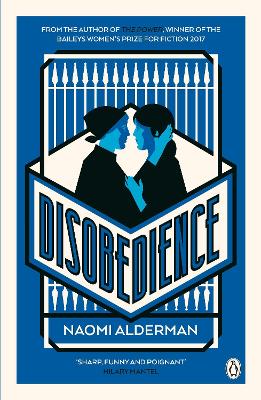Reviewed by brokentune on
I loved the exploration of some of the customs in that particular conservative Jewish community that the story is set in. I loved the juxtaposition of Ronit's thoughts on her own life, which is messy but in which she is herself, and Ronit's former life, which seemed to be dominated by conformity and submission.
It’s difficult to work out the meaning of life in Hendon. I mean, it’s difficult to work it out for yourself, rather than allowing other people to tell you. Because in Hendon there are plenty of people just dying to explain the meaning of life to you. I guess that’s true in New York too, but in New York everyone seems to disagree with everyone else about what the meaning of life is. In Hendon, at least the Hendon I grew up in, everything faced in one direction, there was nowhere to get a grip. You need that disagreement, we all do, so that we can realize that the world isn’t smooth and even, not everyone agrees with everyone else. You need a window into another world to work out what you think of your own.
However, I also felt as if this juxtaposition was a form of manipulation as the portrayal of Ronit's defiance against her former community didn't consider any other approaches to religion that Ronit may have experienced when moving to New York, and in turn this seemed to create a kind of "me v. them" mentality that just doesn't seem plausible.
I mean, I would have understood if her experience growing up had turned Ronit against all religion for example, but it didn't. Instead, her wrath is personal to the very community she grew up in and which she is visiting when her estranged father passes away. The way it comes across in the book, however, is not personal. It comes across as if the particular community was a generalised representation of all practitioners, and Ronit's vengeance was directed against all. The fact that some of the main characters at the receiving end of Ronit's scorn are portrayed as stereotypes does not help.
I have no doubt that such people exist, as they do in all sections of society, but in the context of the book this works against the quality of the book. There are some truly lovely scenes and characters - Ronit, Dovid, Esti, the Goldfarbs, ... - but to focus the frustration, loathing, and defiance of Ronit, Dovid, and Esti on the characters that seem like stereotypes just creates more stereotypes, and this is never a good move in my reading. It just cheapens the book.
"I thought I had come to all sorts of decisions about what I believe. That it is better for things to be said than remain unsaid. That I have nothing to be ashamed about. That those who live narrow lives have only themselves to blame when they find themselves shocked. As it turns out, I don’t seem to have got what Scott would call ‘total buy-in’ from all levels of my brain on those principles. I thought I should phone Dr Feingold, just to let her know that nothing had been resolved even after all this time. Because I did feel it. Shame. They’re not bad people. None of them are. Well, maybe the Hartogs. But the Goldfarbs aren’t bad people. They’re not cruel or unpleasant or malicious. They didn’t deserve to have their peaceful Friday night dinner overturned. They didn’t deserve me smashing my life straight into theirs. It can’t have been right that I did. And if I hadn’t? Yeah, that wouldn’t have been right either."
This is the second of Alderman's books that I've read, and although my issues with this one are different from the ones I had with The Power, there is something in Alderman's writing that yells at me "I'm pushing an agenda here!" that I just cannot help but cringe at.
Btw, this (the original) cover is a much better fit than the current movie tie-in cover.
Also, btw, even though the book was disappointing, I cannot see that the good parts would have been communicated well in the film. I'm curious enough to find out, but I have a feeling that the film's focus will be on affair between Ronit and Esti, not about the issue of breaking with tradition and being outcast from a community, and the changes that can be brought about by a simple application of empathy.
Reading updates
- Started reading
- Finished reading
- 30 December, 2018: Reviewed
